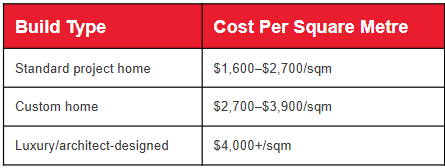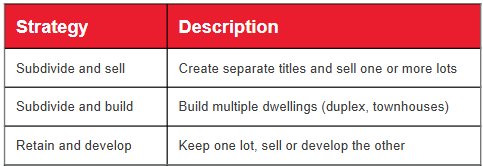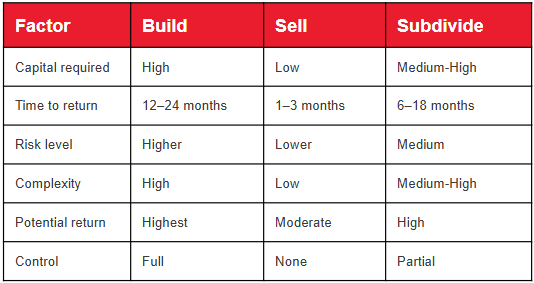What Should You Do With Your Vacant Land?
Owning a block of land gives you options—but deciding what to do with it isn't always straightforward. Should you build and sell? Build and rent? Sell the land as-is? Or subdivide for multiple returns?
Each path has different costs, risks, and potential rewards. Understanding these before you commit can mean the difference between a profitable investment and a costly mistake.
Talk to a Local Agent First
A real estate agent who knows your area can advise whether now is the right time to sell, what your land is worth, and whether building or subdividing makes financial sense. Get expert guidance before making your decision.
The Cost of Holding Vacant Land
Before deciding what to do with your land, understand that holding it isn't free. Until a property is built, you'll likely pay:
- Council rates – Annual fees regardless of whether land is developed
- Land tax – Applicable in most states above certain thresholds
- Loan interest – If you have a mortgage on the land
- Maintenance – Keeping the block tidy and compliant with council requirements
These holding costs add up. Factor them into your decision when comparing the options of building, selling, or waiting.
Option 1: Build on Your Land
Building on your land lets you earn a return through renting or selling the completed property—or create your dream home for yourself.
2025 Building Costs in Australia
Before committing to build, understand the current costs:


For a typical 3-4 bedroom home (200sqm):
- Standard build: $320,000–$540,000
- Custom build: $540,000–$780,000
- Luxury build: $800,000+
Hidden Costs When Building
Beyond the construction quote, budget for:
- Utility connections – Water, gas, electricity, sewerage (can be significant for remote blocks)
- Site preparation – Levelling, soil testing, tree removal, retaining walls
- Council fees and permits – Development applications, inspections, compliance certificates
- Landscaping – Driveways, fencing, gardens (often excluded from builder quotes)
- Variations – Design or material changes during construction
- Contingency – Allow 10–15% for unexpected costs
Important: Building in a busy neighbourhood or off-the-plan development typically means lower utility connection costs than building on isolated land.
Benefits of Building to Rent
If you build with the intention of renting, you can claim tax deductions for:
- Loan interest
- Council rates
- Holding costs during construction
- Depreciation on the completed property
Talk to your accountant about the tax implications before deciding. Building to rent has different financial considerations than building to sell.
Is Building Right for You?
Build if:
- You have the cash or finance to fund the project
- You're comfortable with a 12–18 month timeline
- The numbers work for rental yield or resale value
- You want to create a custom home for yourself
Think twice if:
- Your financial position is uncertain
- Building costs exceed the likely sale price
- You need a quick return on your investment
- The area has limited demand for new homes
Option 2: Sell Your Land
Selling your land as-is avoids the complexity, cost, and risk of building—and gives you capital to invest elsewhere.
When Selling Makes Sense
- High demand area – If your land is in a sought-after location, buyers will pay a premium
- Growing suburb – Land values may have increased since you purchased
- Limited building budget – If you can't afford to build, selling releases your capital
- Better opportunities elsewhere – Use the proceeds to buy an established property
The "Worst House on the Best Street" Strategy
Rather than building from scratch, you could:
- Sell your vacant land at a profit
- Use the proceeds to buy an undervalued property in a good location
- Renovate for a fraction of building costs
- Sell or rent for significant returns
Renovating an existing property can be far more cost-effective than building new—and often delivers faster returns.
Timing Your Sale
The right time to sell depends on your local market:
- Hot market – High demand, low supply = premium prices
- Growing suburb – Consider holding until values peak
- Slow market – May be better to hold or build rather than sell at a discount
A local real estate agent can tell you whether now is a good time to sell—or if you should wait for better conditions.
Option 3: Subdivide Your Land
If you have a large enough block, subdivision lets you profit from part of your land while keeping or developing the rest.
Subdivision Options:

Before You Subdivide, Consider:
1. Local Demand
- Is there demand for smaller lots or multi-dwelling properties in your area?
- Have other properties nearby been subdivided successfully?
- What are similar subdivided lots selling for?
2. Council Approval
- Subdivision requires local council approval
- The process can be lengthy and involve significant red tape
- Check if your area's zoning supports subdivision
3. Costs Involved
- Survey and subdivision fees
- Council application fees
- Legal and conveyancing costs
- Infrastructure contributions
- Potential site works (access, services to new lots)
4. Property Attributes Some features increase subdivision costs:
- Sloping blocks requiring retaining walls
- Easements or covenants restricting development
- Heritage overlays or environmental considerations
- Limited street frontage affecting access
Tip: If other properties in your area have been subdivided, it's generally a positive sign—it indicates council support and market demand.
How to Decide: Build, Sell, or Subdivide?

Questions to Ask Yourself:
- What's my financial position? Can I fund a build without stress?
- What's my timeline? Do I need returns quickly or can I wait?
- What's the local market like? Is there demand for land, new homes, or subdivided lots?
- What are the costs vs. returns? Will building add enough value to justify the expense?
- What's my risk tolerance? Am I comfortable with construction variables?
Talk to the Right Professionals
Making the right decision requires expert advice from multiple sources:
Real Estate Agent
- Land valuation – What's your block worth as-is?
- Market conditions – Is now a good time to sell?
- Demand analysis – What are buyers looking for in your area?
- Subdivision potential – Have similar properties subdivided successfully?
- Sale price estimates – What could a completed home sell for?
Accountant
- Tax implications – CGT on land sale vs. building to rent
- Financing options – How to fund your chosen strategy
- Cash flow analysis – Can you afford the holding costs?
- Structure advice – Personal ownership vs. trust or company
Builder (if considering building)
- Construction quotes – Realistic costs for your block
- Site assessment – Any issues that will add to costs?
- Timeline – How long will the build take?
Find a Real Estate Agent Who Knows Your Area
The right agent can help you understand your options and make an informed decision—whether that's selling your land, building first, or exploring subdivision.
LocalAgentFinder helps you:
- Compare local agents who specialise in land and development
- Review sales history – See who's sold similar properties
- Compare commission rates and marketing fees
- Read independent reviews from other property owners
- Get free appraisals to understand your land's value
Why Landowners Choose LocalAgentFinder:
- Free service – No cost, no obligation
- Side-by-side comparison – Evaluate multiple agents
- Local expertise – Agents who know your market
- Trusted since 2007 – Connecting Australian property owners with top agents
Ready to Explore Your Options?
Find a real estate agent who can appraise your land and guide you through the best path to financial success—whether that's selling, building, or subdividing.
Key Takeaways
- Holding costs add up – Council rates, land tax, and loan interest apply until you build or sell
- Building costs in 2025: $1,600–$4,000+/sqm depending on location and build type
- Hidden costs include utility connections, site prep, council fees, and landscaping
- Selling as-is avoids building risk and releases capital for other investments
- Subdivision can maximise returns if your block is large enough and council approves
- Talk to your accountant about tax implications and financing
- A local agent can advise on market conditions, land value, and the best strategy for your situation
Related Pages
Recent Posts
You might also like

10 Questions to Ask a Real Estate Agent When Selling
December 12, 2025

How Much Is My Property Worth? Valuation Guide
December 15, 2025

What adds value to a house in Australia
March 1, 2022


